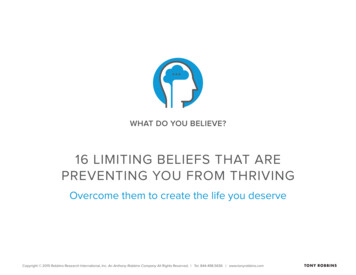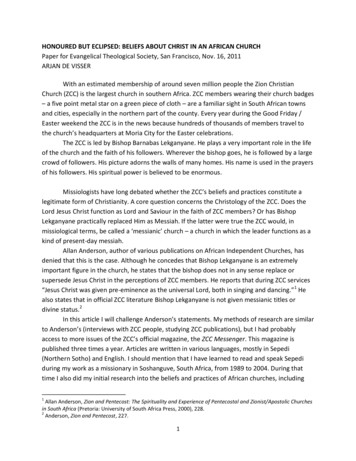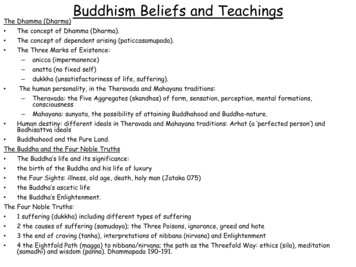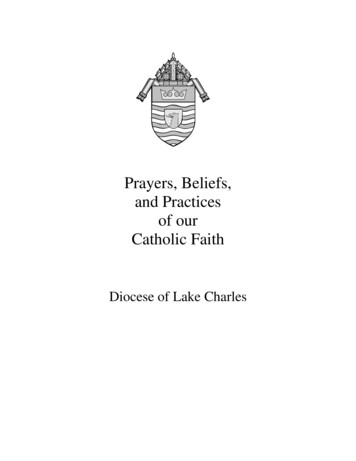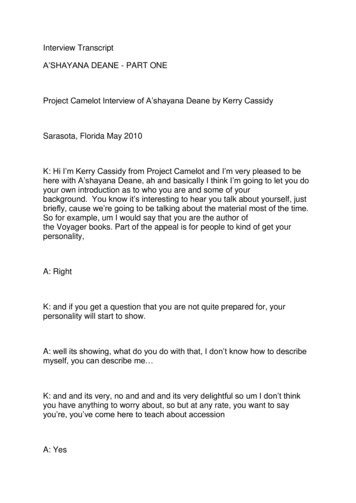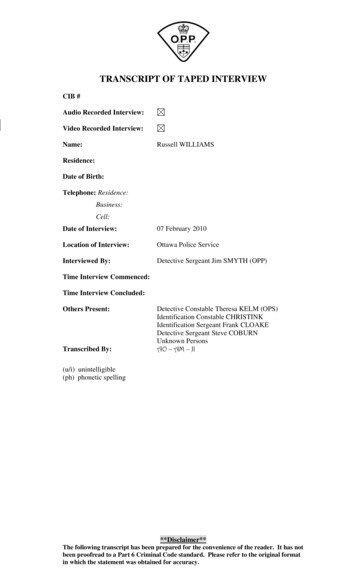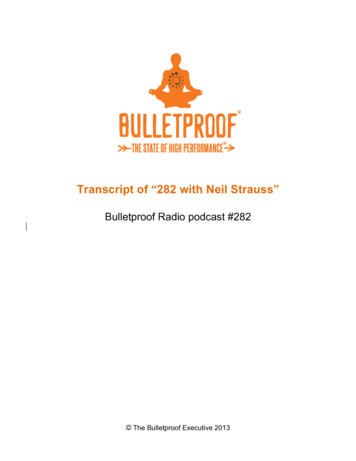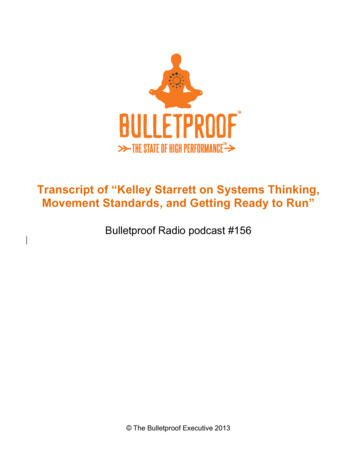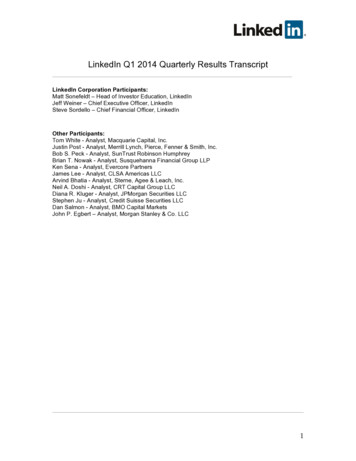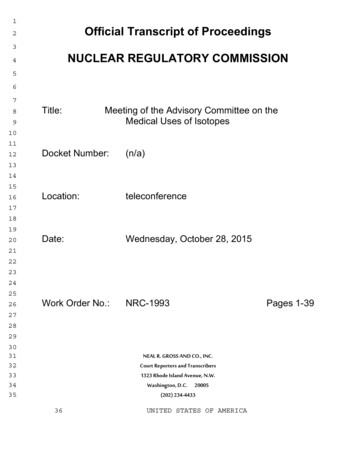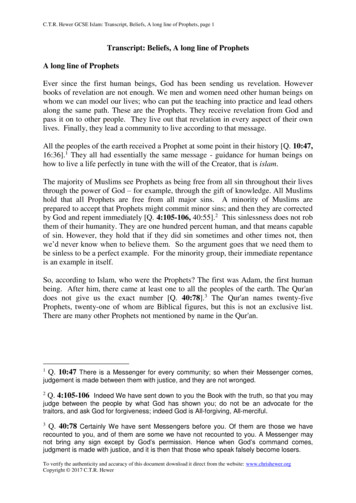
Transcription
C.T.R. Hewer GCSE Islam: Transcript, Beliefs, A long line of Prophets, page 1Transcript: Beliefs, A long line of ProphetsA long line of ProphetsEver since the first human beings, God has been sending us revelation. Howeverbooks of revelation are not enough. We men and women need other human beings onwhom we can model our lives; who can put the teaching into practice and lead othersalong the same path. These are the Prophets. They receive revelation from God andpass it on to other people. They live out that revelation in every aspect of their ownlives. Finally, they lead a community to live according to that message.All the peoples of the earth received a Prophet at some point in their history [Q. 10:47,16:36].1 They all had essentially the same message - guidance for human beings onhow to live a life perfectly in tune with the will of the Creator, that is islam.The majority of Muslims see Prophets as being free from all sin throughout their livesthrough the power of God – for example, through the gift of knowledge. All Muslimshold that all Prophets are free from all major sins. A minority of Muslims areprepared to accept that Prophets might commit minor sins; and then they are correctedby God and repent immediately [Q. 4:105-106, 40:55].2 This sinlessness does not robthem of their humanity. They are one hundred percent human, and that means capableof sin. However, they hold that if they did sin sometimes and other times not, thenwe’d never know when to believe them. So the argument goes that we need them tobe sinless to be a perfect example. For the minority group, their immediate repentanceis an example in itself.So, according to Islam, who were the Prophets? The first was Adam, the first humanbeing. After him, there came at least one to all the peoples of the earth. The Qur'andoes not give us the exact number [Q. 40:78].3 The Qur'an names twenty-fiveProphets, twenty-one of whom are Biblical figures, but this is not an exclusive list.There are many other Prophets not mentioned by name in the Qur'an.1Q. 10:47 There is a Messenger for every community; so when their Messenger comes,judgement is made between them with justice, and they are not wronged.2Q. 4:105-106 Indeed We have sent down to you the Book with the truth, so that you mayjudge between the people by what God has shown you; do not be an advocate for thetraitors, and ask God for forgiveness; indeed God is All-forgiving, All-merciful.3Q. 40:78 Certainly We have sent Messengers before you. Of them are those we haverecounted to you, and of them are some we have not recounted to you. A Messenger maynot bring any sign except by God’s permission. Hence when God’s command comes,judgment is made with justice, and it is then that those who speak falsely become losers.To verify the authenticity and accuracy of this document download it direct from the website: www.chrishewer.orgCopyright 2017 C.T.R. Hewer
C.T.R. Hewer GCSE Islam: Transcript, Beliefs, A long line of Prophets, page 2Prophets named in the Qur'anName in the Qur'anName in the sephShu'aybAyyubJobMusaMosesHarunAaronDhu Alyasa'ElishaYunusJonahZakariyyaZachariahYahyaJohn the Baptist'IsaJesusMuhammadTo verify the authenticity and accuracy of this document download it direct from the website: www.chrishewer.orgCopyright 2017 C.T.R. Hewer
C.T.R. Hewer GCSE Islam: Transcript, Beliefs, A long line of Prophets, page 3The Qur'an says that Jesus foretold the coming of Muhammad [Q. 61:6],4 althoughthere is no obvious reference in the Bible as it has been handed down. The other threenon-biblical Prophets: Hud, Salih and Shu'ayb were earlier Prophets sent to the Arabs.For a person to be a Prophet is the highest dignity that can be given to a human being.Muslims are not allowed to discriminate between Prophets [Q. 2:285, 2:136, 3:84,4:152].5 They are required to believe that they were all the Prophets of God. ThusMuslims believe in Abraham, Moses and Jesus as Prophets. However they are in nosense divine but human beings [Q. 21:7-8, 6:8-9].6Muhammad is the Last and the Seal of the Prophets. The Qur'an makes clear that therewill be no more Prophets after him. He is the Seal, in that he confirmed and validatedall that had gone before him; he is the universal Prophet and for all time.Professor Michot speaks about Prophets named only in the Qur'anIn the Arabian Peninsula, the Qur'an tells us that there were Prophets: Hud,Salih and others, who were sent to Arab communities as they had been sent toother human communities. The important point, I think, is to tell us that the Ahlal-Kitab, the Christians and the Jews, haven’t got a monopoly on prophethood.We have to realise that there were Prophets everywhere during human historyin every human community. And the Qur'an tells us in particular about thoseArabian Prophets, as there were Prophets elsewhere in other times as well.There is more about prophethood than just what we hear in the Bible.Maulana Raza speaks of Muhammad as the perfect human beingProphet [Muhammad] has been termed as al-insan al-kamil, which is theperfect human being, and by that I understand that he is at the peak ofexcellences in every sphere of human life and at the same time he offers thebest possible example of living a very good human life.4Q. 61:6 And when Jesus son of Mary said, “O children of Israel! Indeed I am theMessenger of God to you, confirming what is before me of the Taurat [Torah], and giving thegood news of a Messenger who will come after me, whose name is Ahmad.” Yet when hebrought them manifest proofs, they said, “This is plain magic.”5Q. 2:285 The Messenger believes in what has been sent down to him from his Lord, asdo the believers. Each one [of them] believes in God, his Angels, his Books, and hisMessengers. [They say] "We make no distinction between one and another of hisMessengers." And they say, "We hear, and we obey, [we seek] your forgiveness, our Lord,and towards you is the journey."6Q. 21:7-8 We did not send [any Messengers] before you except as men, to whom Werevealed. Ask the People of the Reminder [those who have received a revelation] if you donot know. We did not make them bodies that did not eat food, and they were not immortal.To verify the authenticity and accuracy of this document download it direct from the website: www.chrishewer.orgCopyright 2017 C.T.R. Hewer
C.T.R. Hewer GCSE Islam: Transcript, Beliefs, A long line of Prophets, page 4The key importance of Abraham (Ibrahim)Abraham is a key figure for the three faiths of Judaism, Christianity and Islam. Hehas great importance in both the Bible and the Qur'an [Q. 2:136, 2:127-129, 6:75-83,14:35-41, 16: 123, 37:83-113].7 Therefore he links the three faiths together.Both Books agree that Abraham and his wife Sarah were elderly and childless and soSarah suggested to Abraham that he take her Egyptian handmaid Hagar as a secondwife. Abraham and Hagar had a son called Isma'il (Ishmael). Then, following amessage from God, Sarah had a child with Abraham, his second son, Isaac.According to the Bible, Sarah wanted Abraham to send away Hagar and Isma'il, asshe now had a son of her own.The Bible says that a message came from God to say that Abraham, who was reluctantto do this, should send them away as God would protect them. Moreover, God wouldraise a great nation from Isma'il. The Bible says no more about Hagar and Isma'il,except to say that both sons were present at the burial of Abraham and that Isma'il’sdescendants settled in the lands between Egypt and Syria. According to Islam,Abraham led them to the valley where Makka now stands [Q. 14:37].8 It was here intime that Abraham and Isma'il would re-build the Ka'ba [Q. 2:125-127]9 and Adamand Eve are said to have worshipped here. The Ka'ba, often called “the House ofGod”, is a cuboid building about 11 metres long, 12 metres wide and 15 metres high,held to be the first building on earth built for the worship of God.The descendants of Isma'il, the Arabs according to the Bible, are seen as the secondpart of the Abrahamic family tree. Through Abraham, Sarah and Isaac, we trace thedescent of Moses and thus the Jews. Jesus was of course a Jew and so Judaism andChristianity are linked. Through Abraham, Hagar and Isma'il we trace the descent ofthe Arabs or Ishmaelites, as the Bible calls them. It’s interesting to note that the7Q. 2:136 Say: "We believe in God, and what was sent down to us, and what was sentdown to Abraham, Isma'il, Isaac, Jacob, and the tribes, and what was given to Moses andJesus, and what was given to the Prophets from their Lord: We make no distinction betweenone and another of them, and to God we are submitting.”8Q. 14:37 Our Lord! I have settled part of my descendants in a barren valley, by yourSacred House, our Lord, that they may establish the prayer. So make the hearts of a groupof the people fond of them, and provide them with fruits, so that they may give thanks.9Q. 2:125-127 And when We made the House [the Ka'ba] a place of assembly for men anda place of safety; and you should take the station of Abraham as a place of prayer; and Wecovenanted with Abraham and Isma'il, that they should purify my House for those who goaround it [in prayer], or use it as a retreat, or bow or prostrate themselves [there]. And whenAbraham said, "My Lord, make this a safe city, and provide its people with fruits, such ofthem as believe in God and the Last Day." He said, "And such as reject faith, for a while I willgrant them their pleasure, but soon I will drive them to the torment of fire, an evildestination!" And when Abraham and Isma'il raised the foundations of the House [with thisprayer], "Our Lord! Accept this from us, for you are the All-hearing, the All-knowing".To verify the authenticity and accuracy of this document download it direct from the website: www.chrishewer.orgCopyright 2017 C.T.R. Hewer
C.T.R. Hewer GCSE Islam: Transcript, Beliefs, A long line of Prophets, page 5Christians called early Muslims Ishmaelites, Hagarites or Saracens (which comesfrom the name Sarah). The Qur'an reinforces this link by speaking of five “resoluteProphets”, who were sent with a Shari'a or Way of Life: Noah, Abraham, Moses,Jesus and Muhammad [Q. 42:13, 33:7].1010Q. 42:13 He has prescribed for you as religion that which he had enjoined upon Noahand which we have [also] revealed to you, and which we had enjoined upon Abraham,Moses and Jesus: “Maintain the religion, and do not be divided in it.” Hard on those who giveGod partners is that to which you invite them. God chooses for it whomever he wants and heguides to it whoever returns penitently.To verify the authenticity and accuracy of this document download it direct from the website: www.chrishewer.orgCopyright 2017 C.T.R. Hewer
how to live a life perfectly in tune with the will of the Creator, that is islam. The majority of Muslims see Prophets as being free from all sin throughout their lives through the power of God – for example, through the gift of knowledge. All Muslims hold that all Prophets are fre
